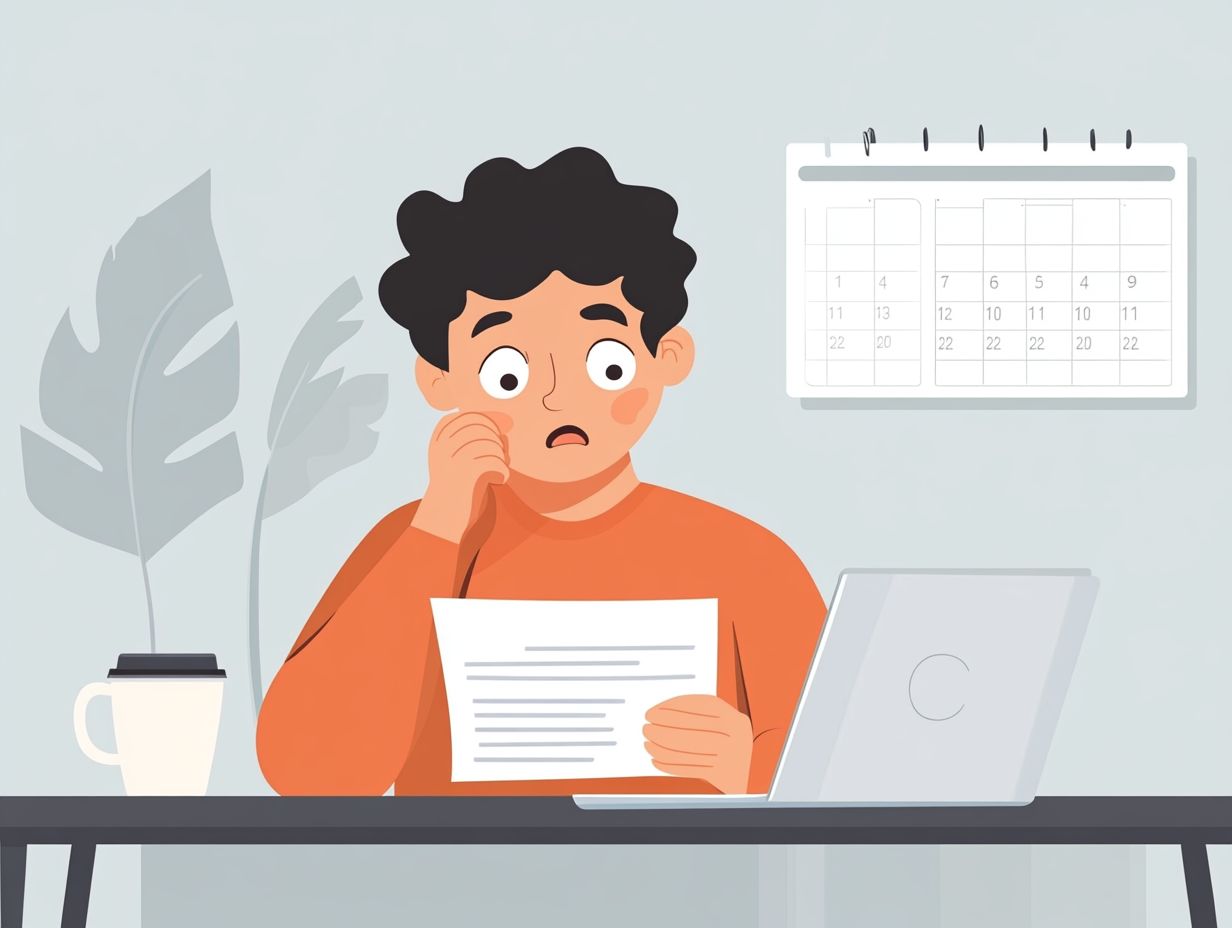Can I Back Out of an Accepted Offer?
Thinking about backing out of an accepted offer? You re not alone! Navigating the complexities of an accepted offer can indeed feel overwhelming, especially when circumstances shift unexpectedly. Whether you re facing a job offer, a real estate agreement, or any other commitment, grasping what an accepted offer truly entails is essential.
This article will delve into the implications of backing out, shedding light on both valid and invalid reasons for reconsideration. You’ll find options for withdrawing or negotiating changes, the potential consequences of those actions, and crucial steps you should take.
Now is the time to take control of your choices don t wait!
Contents
- Key Takeaways:
- Understanding Your Accepted Offer
- Reasons for Wanting to Back Out
- Options for Backing Out of an Accepted Offer
- Consequences of Backing Out
- Steps to Take for Backing Out
- Frequently Asked Questions
- Can I Back Out of an Accepted Offer?
- What are the possible consequences of backing out of an accepted offer?
- Under what circumstances can I back out of an accepted offer without consequences?
- Can I back out of an accepted offer if I change my mind?
- I received a better offer after accepting one. Can I back out of the accepted offer?
- What should I do if I want to back out of an accepted offer?
Key Takeaways:

An accepted offer means that both parties have agreed to the terms and conditions, and backing out may have legal and ethical consequences.
Valid reasons for wanting to back out of an accepted offer include new information or unforeseen circumstances, while invalid reasons may lead to a breach of contract.
Options for backing out include withdrawing from the offer or negotiating changes. It’s important to communicate with the other party and seek professional advice before taking any action.
Understanding Your Accepted Offer
Grasping the details of your accepted offer is essential in the real estate transaction process. This document signifies the formal agreement between you and the seller, detailing the terms of the sale.
It includes various critical components, such as money paid upfront to show you are serious about buying a home, mortgage loan considerations, and specific contract terms. This stage is pivotal for both homebuyers and sellers, ensuring everyone is clear about their rights and obligations as stipulated in the purchase agreement.
Understanding the intricacies of your accepted offer not only helps prevent potential disputes but also paves the way for smoother transactions in the housing market.
What Does an Accepted Offer Mean?
An accepted offer indicates that the seller has agreed to the terms you proposed, setting off a legally binding process filled with various contract details and homebuyer rights. This acceptance solidifies the agreement and marks the start of a formal commitment between all parties involved.
Once your offer is accepted, the seller is legally obligated to adhere to its terms. This allows you to confidently rely on your investment. Real estate agents are essential in this process; they facilitate negotiations and ensure that all legal documentation is meticulously handled, protecting the interests of both you and the seller.
These professionals help you navigate your rights with clarity and assurance throughout the transaction, which is crucial for avoiding disputes later on.
Reasons for Wanting to Back Out
There are various reasons why a buyer might wish to withdraw from an accepted offer in a real estate transaction. These reasons can be categorized as valid or invalid and typically relate to discoveries made during the home inspection or appraisal contingencies.
Grasping these reasons is vital for both buyers and sellers, as the intricate nature of contract terms can lead to potential legal complications if not handled properly. It s imperative for buyers to articulate their intentions clearly to their real estate agent to prevent misunderstandings.
Valid and Invalid Reasons
Valid reasons for backing out can include bad findings from a home inspection, financial circumstances that impede your ability to move forward, or significant changes in your personal situation.
Conversely, invalid reasons often arise from buyer’s remorse or second-guessing after you’ve already accepted the offer. When a home inspection reveals serious issues like structural problems or outdated electrical systems, you might discover unfavorable outcomes that require substantial repairs.
Financial changes could involve job loss, increased debt, or unexpected expenses that jeopardize your ability to secure a mortgage. Conversely, invalid reasons typically stem from emotional responses feeling overwhelmed by the commitment or questioning the price in relation to market trends.
By understanding these distinctions, you can navigate your choices with clarity and confidence, ensuring that your decisions align with your true needs and circumstances.
Contact your real estate agent today to discuss your options!
Options for Backing Out of an Accepted Offer

When a buyer backs out of an accepted offer, you must act quickly. Here are several strategic options to consider.
You can formally withdraw from the offer or talk with the seller about changes to the contract terms that benefit you. This is possible if there are contingency clauses protecting your interests.
This step is crucial. Failing to clearly communicate your intentions could lead to legal repercussions from the seller. It s important to understand your rights in real estate transactions.
Withdrawing from the Offer
Withdrawing from an offer is a big decision. Understand how it affects your earnest money and your contract. This choice can impact your rights as a homebuyer and may have financial consequences.
To navigate this process, review the specific contingencies outlined in the agreement. These may include financing, inspections, or other critical conditions. Remember, each contract is unique, and knowing when to act is essential.
You ll often find that you need to submit documentation to express your intent to withdraw. Understanding the timeline for notification is vital to avoid penalties or losing your earnest money. Not following these protocols could lead to forfeiting your deposit, adding stress to an already complicated situation.
Negotiating Changes to the Offer
Instead of pulling out, consider negotiating! You can discuss terms with the seller to protect your interests. Talk about specific terms, potentially including contingency clauses that address concerns from inspections or appraisals.
By maintaining open communication, you can share your concerns about repair costs, inspection results, or appraisal discrepancies.
If an inspection reveals significant repairs are needed, you might suggest a lower price or ask the seller to handle those repairs before finalizing the deal.
Using supportive data, like comparable sales in the neighborhood, can strengthen your position. Flexible negotiation tactics, such as adjusting closing dates or requesting seller credits, can lead to a mutually beneficial agreement, paving the way for a smoother transaction process.
Consequences of Backing Out
Backing out can lead to serious consequences. Act wisely to avoid losing your earnest money and facing legal action.
It can also create complex implications regarding your rights as a homebuyer, especially if your reasons for withdrawing are seen as unfounded. Sellers may pursue legal remedies if they feel wronged, including claims related to title disputes, which complicate the process further.
Carefully consider these factors before making a decision.
Legal and Ethical Considerations
Backing out can lead to legal trouble. Know that violating contract terms can open the door to action from the seller. Ethical considerations often revolve around maintaining transparency and good communication with your real estate agent throughout the process.
The enforceability of the contract is at stake, as specific clauses typically outline the consequences of withdrawal. You and the seller must pay close attention to the contractual language that defines your obligations and rights.
If you choose to pull out, it’s vital to check if any conditions, like contingencies, were established. Sellers also have ethical responsibilities, including the duty to mitigate damages.
Ultimately, these dynamics highlight the necessity of understanding both legal ramifications and ethical duties in any real estate transaction.
For personalized guidance, consider consulting a real estate professional.
Steps to Take for Backing Out

When contemplating backing out of an accepted offer, it s important to follow specific steps.
- Start by clearly communicating your intentions to the seller, preferably through a real estate agent.
- Getting professional advice is very helpful, as it can guide you through the complexities of the situation while ensuring you comply with legal requirements and contract terms.
Taking these measures can help create a smoother process and protect your interests effectively.
Communicating with the Other Party
Effectively sharing your intentions with the seller is essential when you decide to back out of an accepted offer. This fosters transparency and helps reduce potential conflicts. Your real estate agent can articulate your concerns and reasons based on the contract terms.
Using techniques like active listening and showing empathy can significantly ease any tension. Your agent acts as a neutral intermediary, ensuring messages are conveyed clearly while navigating the emotional aspects of the transaction.
They understand the complexities of the real estate market and can clear up misunderstandings, providing reassurance to both you and the seller. By emphasizing reasons such as financial worries or personal circumstances influencing your decision, your agent can help maintain constructive dialogue, leading to a smoother resolution.
This approach illustrates the power of effective communication in real estate dealings.
Seeking Professional Advice
Getting professional advice is crucial if you’re considering backing out of an accepted offer. Consulting with a real estate agent or legal professional can clarify your rights as a homebuyer and the potential for legal action if the situation worsens.
This guidance is especially important as you navigate the maze of complex contracts and state-specific regulations. It can be daunting if you’re not already familiar with the process. Professional advisors can help you understand your unique circumstances, ensuring you grasp both the financial and emotional implications of your decision.
With tailored advice, you can explore reasonable contingencies, potential negotiations, or alternative options that might help lessen any negative consequences. In many cases, an expert’s insight can help you avoid unnecessary disputes, highlighting the importance of addressing such significant decisions with the right support.
Frequently Asked Questions
-
Can I Back Out of an Accepted Offer?
-
Yes, you can back out of an accepted offer, but it may have consequences depending on the terms of the offer and the circumstances surrounding it.
-
What are the possible consequences of backing out of an accepted offer?
-
The consequences can vary, but they may include losing your deposit, being sued for breach of contract, or damaging your reputation in the industry.
-
Under what circumstances can I back out of an accepted offer without consequences?
-
If there is a contingency clause in the offer that allows you to back out for a specific reason, such as a failed inspection or financing, you may be able to do so without facing consequences.
-
Can I back out of an accepted offer if I change my mind?
-
It depends on the terms of the offer and the reason for changing your mind. If there is no contingency clause or valid reason, you may face consequences for backing out of the offer.
-
I received a better offer after accepting one. Can I back out of the accepted offer?
-
This can be a tricky situation, and it is best to consult with a legal professional. In most cases, if you have already signed a contract and accepted an offer, you may face consequences for backing out, even if it is for a better offer.
-
What should I do if I want to back out of an accepted offer?
-
The best course of action is to communicate with the other party involved and try to negotiate a mutual agreement to terminate the offer. If necessary, seek legal advice to understand your rights and the potential consequences of backing out.







